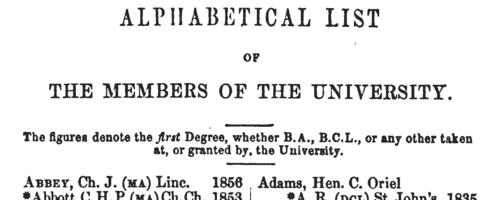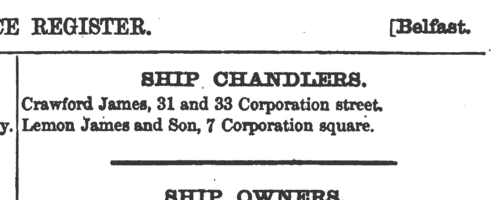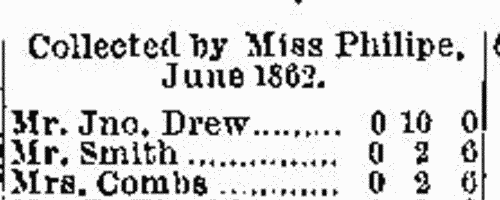Dix Surname Ancestry ResultsOur indexes 1000-1999 include entries for the spelling 'dix'. In the period you have requested, we have the following 550 records (displaying 351 to 360): Single Surname Subscription | | | Buying all 550 results of this search individually would cost £3,174.00. But you can have free access to all 550 records for a year, to view, to save and print, for £100. Save £3,074.00. More... |
These sample scans are from the original record. You will get scans of the full pages or articles where the surname you searched for has been found. Your web browser may prevent the sample windows from opening; in this case please change your browser settings to allow pop-up windows from this site.  British infantry fighting in China
(1860) British infantry fighting in China
(1860)
The China Medal was awarded to soldiers and sailors who took part in the prosecution of the war against the Chinese from 1856 to 1860. Separate clasps were awarded for men who had been in receipt of the China Medal of 1842; for being actually present at Canton on 28 and 29 December 1857, when that city was bombarded and finally captured; for being actually engaged in the operations which ceased with the first capture of the Taku Forts, 20 May 1858, and led to the Treaty of Tientsin; for being actually present at the capture of the Taku Forts 21 August 1860; and for being actually present before Pekin the day the gate of that city was given up to the allied (British and French) army, viz. on 13 October 1860. The 99th (Lanarkshire) Regiment of Foot, based at Cork, embarked for India in September 1858, and was transferred to China in 1860; moved to South Africa in 1865, and returned to England in 1869. The regiment took part in the capture of Pekin.DIX. Cost: £8.00.  | Sample scan, click to enlarge

| Members of Oxford University
(1860)
The Oxford University Calendar for 1860 includes this list of all living members of the university, i. e. not only undergraduates and members of staff, but also all surviving graduates from earlier generations. The names are arranged alphabetically by surname, then by college in order of foundation. Surnames are given, initials, highest degree, name of college, and then the year of graduating the first degree. For undergraduates only name and college is given. An asterisk before a surname indicates a member on the foundation of the college. DIX. Cost: £4.00.  | Sample scan, click to enlarge

| Long-stay Paupers in Workhouses: Bath
(1861)
This comprehensive return by the Poor Law Board for England and Wales in July 1861 revealed that of the 67,800 paupers aged 16 or over, exclusive of vagrants, then in the Board's workhouses, 14,216 (6,569 men, 7,647 women) had been inmates for a continuous period of five years and upwards. The return lists all these long-stay inmates from each of the 626 workhouses that had been existence for five years and more, giving full name; the amount of time that each had been in the workhouse (years and months); the reason assigned why the pauper in each case was unable to sustain himself or herself; and whether or not the pauper had been brought up in a district or workhouse school (very few had). The commonest reasons given for this long stay in the workhouse were: old age and infirm (3,331); infirm (2,565); idiot (1,565); weak mind (1,026); imbecile (997); and illness (493). DIX. Cost: £6.00.  | Sample scan, click to enlarge

| Long-stay Paupers in Workhouses: Cheltenham
(1861)
This comprehensive return by the Poor Law Board for England and Wales in July 1861 revealed that of the 67,800 paupers aged 16 or over, exclusive of vagrants, then in the Board's workhouses, 14,216 (6,569 men, 7,647 women) had been inmates for a continuous period of five years and upwards. The return lists all these long-stay inmates from each of the 626 workhouses that had been existence for five years and more, giving full name; the amount of time that each had been in the workhouse (years and months); the reason assigned why the pauper in each case was unable to sustain himself or herself; and whether or not the pauper had been brought up in a district or workhouse school (very few had). The commonest reasons given for this long stay in the workhouse were: old age and infirm (3,331); infirm (2,565); idiot (1,565); weak mind (1,026); imbecile (997); and illness (493). DIX. Cost: £6.00.  | Sample scan, click to enlarge

| Long-stay Paupers in Workhouses: Clerkenwell
(1861)
This comprehensive return by the Poor Law Board for England and Wales in July 1861 revealed that of the 67,800 paupers aged 16 or over, exclusive of vagrants, then in the Board's workhouses, 14,216 (6,569 men, 7,647 women) had been inmates for a continuous period of five years and upwards. The return lists all these long-stay inmates from each of the 626 workhouses that had been existence for five years and more, giving full name; the amount of time that each had been in the workhouse (years and months); the reason assigned why the pauper in each case was unable to sustain himself or herself; and whether or not the pauper had been brought up in a district or workhouse school (very few had). The commonest reasons given for this long stay in the workhouse were: old age and infirm (3,331); infirm (2,565); idiot (1,565); weak mind (1,026); imbecile (997); and illness (493). DIX. Cost: £6.00.  | Sample scan, click to enlarge

| Long-stay Paupers in Workhouses: Witney
(1861)
This comprehensive return by the Poor Law Board for England and Wales in July 1861 revealed that of the 67,800 paupers aged 16 or over, exclusive of vagrants, then in the Board's workhouses, 14,216 (6,569 men, 7,647 women) had been inmates for a continuous period of five years and upwards. The return lists all these long-stay inmates from each of the 626 workhouses that had been existence for five years and more, giving full name; the amount of time that each had been in the workhouse (years and months); the reason assigned why the pauper in each case was unable to sustain himself or herself; and whether or not the pauper had been brought up in a district or workhouse school (very few had). The commonest reasons given for this long stay in the workhouse were: old age and infirm (3,331); infirm (2,565); idiot (1,565); weak mind (1,026); imbecile (997); and illness (493). DIX. Cost: £6.00.  | Sample scan, click to enlarge

| Members of the Royal Agricultural Society of England
(1861)
The list of members of the Royal Agricultural Society gives names and addresses: life members are indicated by a dagger. (The names of 60 members were omitted on account of their subscriptions to the society being in arrear to 31 December 1859). This list is correct to June 1861; as of 11 December of that year there were 84 life governors, 95 annual governors, 1124 life members, 3399 annual members and 17 honorary members, making a total of 4719 names, mostly of landowners and agriculturists.DIX. Cost: £4.00.  | Sample scan, click to enlarge

| Carpenters Excluded from the Union: Battersea
(1863)
Each annual report of the Amalgamated Society of Carpenters and Joiners included a list of excluded members, arranged by branch. The great majority of the exclusions were for non-payment of entrance money or arrears, but other reasons are cited from time to time - fraud; bringing the society into discredit; dishonesty; entering the society under false pretences; working contrary to the society's interest; not being a competent workman. In most cases names are given in full.
DIX. Cost: £6.00.  | Sample scan, click to enlarge

| London Local Marine Board Ship Owners
(1863)
Straker's Annual Mercantile, Ship and Insurance Register includes lists of ship owners in Belfast, Cardiff, Colchester, Dover, Dublin, Falmouth, Folkestone, Grimsby, Hartlepool, Harwich, Hull, Leith, London, Lynn, Newcastle, Penzance, Plymouth, Ramsgate & Margate, South Shields, Sunderland, Swansea, Wisbech and Yarmouth. In addition, there is this list of ship owners entitled to vote in the election of members to serve on the Local Marine Board of London, giving surname, christian name(s), address, and the number of votes.DIX. Cost: £4.00.  | Sample scan, click to enlarge

| Missionaries and contributors
(1863)
The Evangelical Magazine and Missionary Chronicle records the work of Christian missionaries throughout the world, and of the supporting missionary societies collecting money for the work in the British Isles. Contributions are listed by congregation, and by family members making donations.DIX. Cost: £8.00.  | Sample scan, click to enlarge

|
Research your ancestry, family history, genealogy and one-name study by direct access to original records and archives indexed by surname.
|













